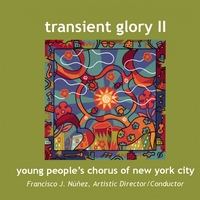In this follow-up to its 2003 Transient Glory CD (please type Q7284 in Search Reviews), Francisco Nuñez and his Young People’s Chorus of New York City offer another impressive slate of new compositions presented in similarly savvy, stylish, technically proficient performances. The “children’s choir” movement over the last 25 years or so has seen the rise of dozens of world-class ensembles that attract and commission works from major composers–as we hear on this new release, which features pieces “premiered by the chorus between 2002 and 2004.”
Highlights–which for me are the works in which the composer seems to truly understand and capture the uniqueness of these voices, selects carefully and elucidates the chosen texts, and gives the choir some really “singable”, attractive music to sing–are Judith Weir’s Little Tree (texts by e.e. cummings, with a cleverly written marimba accompaniment), Tod Machover’s I Dreamt a Dream (from William Blake, which effectively employs electronic sounds), Geoffrey Burgon’s Shirtless Stephen (and the Children’s Crusade), with its wonderful Britten-esque melody and text/rhythm treatment, and Benjamin Lees’ delightful take on Edward Lear’s humorous poem The Nervous Family. In each of these pieces, the choir really shines with vibrant energy and a confident, commanding vocal presence.
Some of the featured works make more of an impression for their difficulty than for their attractiveness or effectiveness as vocal music–indeed Michael Nyman’s A Child’s View of Color might as well be an instrumental work; the vocal writing renders most of the words unintelligible and creates a vocal timbre that just sounds strained. In addition–and this also was true on the earlier recording–the weird balances between choir and instruments (especially so in the Nyman work) only detract from what we should be hearing from the singers. Nils Vigeland’s Miracles and Bright Sheng’s The Boatmen’s Song are both busy, challenging works, but they seem more consumed by their structural and thematic ideas than with giving the audience music to look forward to hearing again. Kevin James’ NYC Playground just seems contrived and too long for its material–and again, the strange miking and odd balances undo the whole thing.
There’s more here, including fine works by Jim Papoulis (an experienced composer for youth choirs) and Dominick Argento (his first work for young voices!)–and a mixed bag from David Del Tredici, a set of four pieces that includes the bizarre Sabbath’s Child and a wonderful, nifty “fuga” based on the Alphabet text from the 1727 New England Primer. (Bizarre also is the word for Del Tredici’s own descriptions of his music, which he says normally is “larger-than-life”, but for this he had to “distill myself down.”)
As with the first Transient Glory disc, this is a must for choir fans who wish to be close to the latest happenings in one of today’s most exciting, endlessly inventive, and uniquely challenging (for both singers and audiences) areas of music creation and performance. Happily for those who want to take this further, all of this music has been published, and information about the composers and where to obtain the scores is provided in the detailed liner booklet. On to Volume 3!
































